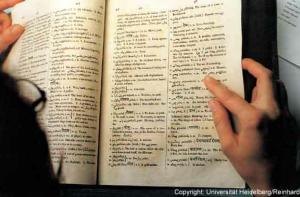South Asian Cultural and Religious History (Classical Indology)

Course outline
Course structure
Main research interests
Formal requirements
Academic advisor
Contact
| Degree: | Bachelor of Arts |
| Application: | not required |
| Course commences: | winter semester only |
| Standard course duration: | 6 semesters |
| Focus options: | 50%; 25% |
| Language requirements: | none |
| Language of instruction: | German |
As of the winter semester 2016/17, the B.A. programme in South Asian Cultural and Religious History (Classical Indology) will no longer be available. It is, therefore, not possible to apply for admission to this programme.
Course outline
General points
In research and teaching, Indology is the study of the languages, cultures, religions, literatures, philosophies and history of the Indian subcontinent. The emphasis in all these cases is on language and the relevant text material, which is the starting point for all further investigation. At Heidelberg University’s South Asia Institute (SAI), this vast sector is split up into various individual disciplines, including History of South Asia, Anthropology relating to that region, and Political Science with specific reference to it. At the SAI, Indology itself resolves itself into two independent divisions with a line of demarcation distinguishing (approximately) between linguistic concerns and historical phenomena. Classical Indology concentrates in research and teaching on the Old and Middle Indic languages (notably Sanskrit) and investigates the material that has come down to us in terms of its relevance for religious studies and cultural studies. Modern Indology (modern languages and literatures of South Asia) focuses in research and teaching on the modern languages of the subcontinent whether Indo-Germanic (Hindi, Urdu, Bengali) or Dravidic (Tamil) and investigates issues typically discussed by literary studies and the social sciences. A clear division in historical terms is hardly possible as the issues addressed in Classical Indology may have a bearing on the present, while subject matter covered in Modern Indology may have all kinds of links with historical events.
Classical Indology (Indology I)
Since the winter term 2007/08, the former Magister courses with Classical Indology (Indology I) as a main or subsidiary subject have been replaced by the B.A. and M.A. programmes entitled South Asian Religious and Cultural History (Indology I).
The foundation and the heart of the course is the training of the students in Sanskrit at all its different evolutionary levels (Vedic, Classical, Hybrid). After a two-semester introductory phase, the foundational knowledge imparted up to that point is consolidated and extended in reading classes. Alongside this linguistic proficiency aspect, the reading classes are also designed to familiarise the students with the most important varieties of the relevant text material and their specific features, to discuss text-critical matters, investigate the content of the texts and thus establish a degree of fundamental cultural knowledge. This foundational knowledge is extended in the lectures on the great classical religions of South Asia (Brahmanism, Hinduism, Buddhism, Jinism) and their societal and cultural aspects. In the seminars, secondary literature and sometimes primary sources are drawn upon to examine individual aspects and issues related to religiosity, philosophy, society, culture and scholarship in more detail. As of the second semester, B.A. students with Classical Indology or South Asian Religious and Cultural History (Indology I) as their main subject also learn either a second Middle Indic language (Pali, Prakrit) or another New Indic language (Nepali, Hindi, etc.). This proficiency in a second language is designed to help students investigate material and topics that go beyond the limits of Sanskrit.
While the B.A. programme provides students with a sound grounding in the sectors referred to, the M.A. course familiarises them with up-to-date research, its content and methods and thus enables them to complete their first piece of independent written research (the M.A. thesis).
Course structure
B.A. “South Asian Religious and Cultural History (Indology I)”
In both the main (50%) and the subsidiary (25%) formats, training in Sanskrit takes place via Basis Module I (Sanskrit) and a further module entitled Literature (Sanskrit). Basic Module II provides students with an overview of the central issues addressed by the discipline. In the subsidiary format, the content of these classes is supplemented by elective-compulsory modules on (i) Religion and History and (ii) History of Culture and Philosophy. Main-subject students take a further compulsory module on History of Culture and Philosophy and an elective module Religion and History that can be replaced by a comparable module from the departments of South Asian History or of Modern Languages and Literatures of South Asia (Indology II). Training in the second language takes place via a further elective module entitled “Second Language (Pali)” or “Second Language (Languages of the Himalayas)” or a module called “Second Language (Hindi/Urdu/Bengali/Tamil)” offered by the department of Modern Languages and Literatures of South Asia. The course closes with the oral examination and the B.A. thesis.
For more details, consult the Examination Regulations referred to below.
Main research interests
Classical Indology in Heidelberg focuses on religiosity in the framework of the great religions of the subcontinent, Hinduism and Buddhism, with special emphasis on societal and cultural aspects. Other major concerns are the investigation of texts in context, notably on the subject of rituals, classical legal systems and philosophy.
In regional terms, the main emphasis is on Nepal and South India.
Formal requirements
Admission
There are no admission restrictions. Click here for instructions on how to enrol.
International applicants
There are special regulations for international applicants. Please consult Heidelberg University’s International Relations Office (Dezernat Internationale Beziehungen, Seminarstraße 2) for more information.
Subject combinations
Subject combinations are listed in the Catalogue of Subjects.
Study and examination regulations
Examination regulations B.A. (25 January 2007)
Module Handbook
Please click here to find the latest Module Handbook.
Examinations board
Issues arising in connection with examinations, credit transfer and academic credential recognition are dealt with by the relevant examinations board/office. For more information, consult the academic advisor(s) indicated below.
Fees
Tuition fees at Heidelberg University are payable at the beginning of each semester.
M.A. course
Heidelberg University offers a consecutive M.A. course on South Asian Cultural and Religious History.
Academic advisor
Anand Mishra, M.A.
Im Neuenheimer Feld 330, Office 305
office hours: Tuesdays 2 – 4 pm and by appointment
phone: +49 (0)6221 544907
e-mail: amishra@ix.urz.uni-heidelberg.de
Contact
South Asia Institute
Department of Classical Indology
Im Neuenheimer Feld 330
D-69120 Heidelberg
Secretaries' office:
Julie Pusch
Office 313
phone: +49 (0)6221 548817
fax: +49 (0)6221 546338
e-mail: klassische-indologie@uni-heidelberg.de
Internet: www.sai.uni-heidelberg.de/abt/IND/index.html
Location
Student representation:
Internet: http://fachschaftsai.wordpress.com/
e-mail: fachschaftsai@googlemail.com

